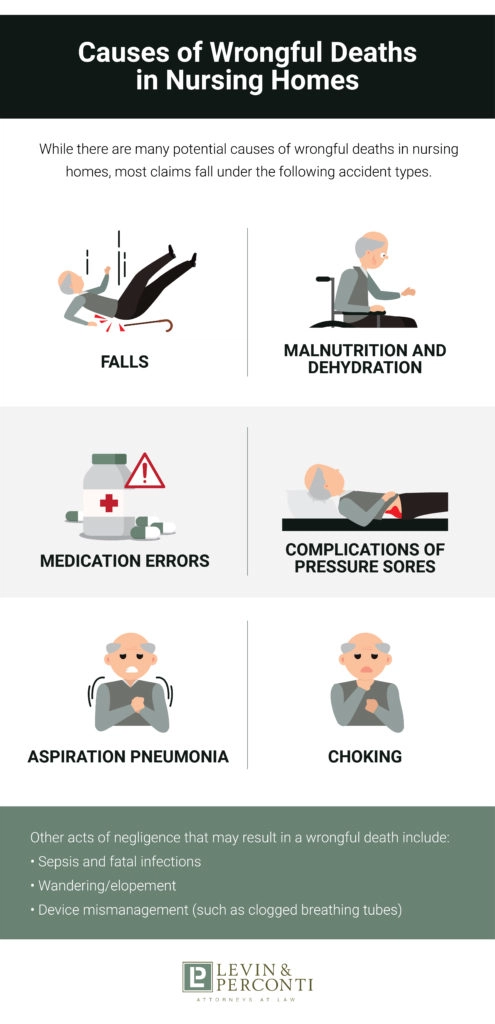Nursing Home Wrongful Death
An estimated 1.4 million Americans occupy more than 15,000 nursing homes across the nation. Illinois has around 1,200 of these facilities, providing around-the-clock care for an estimated 100,000 residents. Unfortunately, while families put a great deal of trust in these long-term treatment homes, residents of skilled nursing facilities often become victims of abuse or neglect, sometimes resulting in death.
- What Is Wrongful Death in a Nursing Home?
- Causes of Wrongful Deaths in Nursing Homes
- Steps to Take After Losing a Loved One to Nursing Home Malpractice
- Filing a Wrongful Death Lawsuit in Illinois
- Who Can File a Wrongful Death Claim in Illinois?
- Who Can Be Liable for a Nursing Home Wrongful Death in Illinois?
- Process to File a Claim for Your Loved One’s Wrongful Death at a Nursing Home in Illinois
- How Long Do I Have to File a Claim in Illinois?
- Proving a Wrongful Death Claim Against a Nursing Home
- What Damages Can I Recover From a Nursing Home Wrongful Death in Illinois?
- How Can an Illinois Nursing Home Wrongful Death Attorney Help Me?
What Is Wrongful Death in a Nursing Home?
Illinois law defines wrongful death as one that occurs as a result of neglect or abuse. The types of accidents that can result in wrongful death in a nursing home include:
- Deaths resulting from negligence
- Negligence refers to care and treatment that falls below the standard of care.
- Deaths resulting from intentional acts
- Elder abuse is an intentional act.
Note that anyone, not just medical professionals, can be liable for negligence. Negligence and medical malpractice share characteristics that include a breach of duty and deviation from a standard of care, but to be liable for medical malpractice, the person causing the injury must be a medical professional.
Causes of Wrongful Deaths in Nursing Homes
While there are many potential causes of wrongful deaths in nursing homes, most claims fall under the following accident types.
Falls
Each year, approximately half of all the residents in nursing homes suffer a fall. Falling is common for older individuals who frequently experience declines in vision and weakness in the muscles and bones due to aging or medical conditions. Nursing home facilities are required to develop a care plan for all nursing home residents that must include fall prevention measures such as assistance when getting up or walking, especially if the resident has a history of falls or unsteadiness. Failing to follow this carefully constructed care plan and provide needed assistance can result in a wrongful death claim if a resident falls and suffers a fatal injury as a result.
Malnutrition and Dehydration
Just as many older and vulnerable nursing home residents need help moving around to avoid falling, they also need assistance with ensuring that they get the right nutrition and hydration for optimal health and functioning. Unfortunately, understaffing and lack of existing staff training can result in many already frail residents suffering from malnutrition and dehydration when not provided with adequate food sources per special diets or feeding assistance and fluid intake.
Medication Errors
Medication errors are among the most common mistakes in any health care setting, including skilled nursing facilities. These errors can include overmedication, providing the resident with the wrong medication or incorrect dose or failing to administer prescribed medication to the patient altogether. Improper medication administration can also be a frequently occurring mistake, such as crushing a pill for a resident when the labeled instructions state that the medicine should be ingested whole.
One of the many services that most Illinois nursing homes provide for residents is administering needed medications, but again, because of understaffing, inadequate training, or failure of a certified or licensed provider to handle patient medications per labeled instructions and facility policies, medication errors can likely happen, sometimes leading to a subsequent wrongful death claim.
Complications of Pressure Sores
Pressure sores, also called bed sores or pressure ulcers, are skin and soft tissue injuries that form on bony prominences like the sacrum, heels, elbows, and hips. These are preventable injuries that can quickly become serious threats to a resident’s health. When a pressure sore advances to the point of being an open wound, risk of infection increases. Infections can spread to the surrounding bone, potentially necessitating the full or partial amputation of a limb. This may decrease the resident’s long term mobility in addition to subjecting them to serious surgeries. A persistent pressure sore infection can further lead to sepsis and death.
Aspiration Pneumonia
The National Library of Medicine states that “[a]spiration pneumonia occurs when food, saliva, liquids, or vomit is breathed into the lungs or airways leading to the lungs, instead of being swallowed into the esophagus and stomach.”
Because old age is a risk factor for breathing in foreign objects, older adults with dementia or swallowing problems should be carefully monitored for symptoms, including chest pain, coughing up phlegm that contains pus or blood, fever, and fatigue. Failure of nursing home staff to recognize and treat these symptoms could result in death.
Choking
A commentary published in Geriatrics noted that “people over 65 years of age have seven times higher risk for choking on food than children aged 1–4 years of age.” Age-related eating and swallowing difficulties make nursing home residents susceptible to choking. Nursing home staff should take careful measures to mitigate the risk of choking, including adhering to dietary restrictions and observing residents during meals.
Other acts of negligence that may result in a wrongful death include:
- Sepsis and fatal infections
- Wandering/elopement
- Device mismanagement (such as clogged breathing tubes)
Steps to Take After Losing a Loved One to Nursing Home Malpractice
If your loved one died as a result of the careless or reckless actions of a care provider at a nursing home, or their failure to take necessary precautions to protect the safety of your elderly family member, you should do the following:
- Report the abuse to your long-term care ombudsman or the state’s 24-hour adult protective services hotline.
- Obtain as much evidence as you can to support your claim, including the contact information of any witnesses, as well as medical and autopsy results revealing the cause of death.
- Contact a nursing home wrongful death attorney to learn how to obtain compensation for your financial and emotional losses.
Filing a Wrongful Death Lawsuit in Illinois
Family members of a nursing home resident who died because of staff negligence or intentional actions can seek compensation for their losses through a wrongful death lawsuit. This type of legal claim filed in civil court seeks to prove liability for your loved one’s untimely death and compensate you for the resulting financial burden, as well as pain and suffering.
Who Can File a Wrongful Death Claim in Illinois?
In some states, a family member can file a wrongful death claim. However, in Illinois, the claim must be filed by a named or appointed personal administrator or executor of the deceased’s estate on behalf of the estate and family members. Often, the estate’s personal representative is a close relative, such as the decedent’s spouse or adult child.
Who Can Be Liable for a Nursing Home Wrongful Death in Illinois?
Licensed health care providers can be liable for malpractice involving medication errors or other erroneous health care services. Additionally, nursing home facilities can be liable for wrongful deaths that resulted from their failure to:
- Properly vet or train employees
- Develop policies and protocols for handling resident safety
- Correct known property hazards at the facility
- Protect the resident from physical harm caused by other residents or staff members
Furthermore, nursing homes are liable for the negligent actions of their employees, without exception.
Process to File a Claim for Your Loved One's Wrongful Death at a Nursing Home in Illinois
The process to file a claim begins with contacting an attorney who will evaluate the details of your case.
Depending on the nature of your claim, litigation may include filing a lawsuit, making a settlement demand, or going to trial.
It’s important to choose a law firm with experienced trial attorneys to ensure you get the compensation you deserve.
How Long Do I Have to File a Claim in Illinois?
Generally, in Illinois, you must file a wrongful death claim within two years of the date of injury or death, so it is imperative that you contact an attorney immediately upon becoming aware of an injury.
Proving a Wrongful Death Claim Against a Nursing Home
To prove a nursing home wrongful death claim, an attorney must demonstrate that:
- The nursing home had a duty to provide care to the resident.
- The nursing home breached the duty of care owed to the resident by failing to protect them from injury.
- The negligent act or omission by the nursing home or its staff resulted in a fatal injury to the resident and caused them or loved ones to incur expenses and psychological impacts.
What Damages Can I Recover From a Nursing Home Wrongful Death in Illinois?
Illinois allows wrongful death claimants to seek the recovery of economic damages, referring to compensation provided for the financial losses stemming from the death. These include damages for the pain and suffering, disability, disfigurement, and medical expenses incurred by the decedent from the time of injury to time of death.
State law also allows the heirs of the decedent in a wrongful death case to recover the loss of society — which legally includes attention, companionship, comfort, guidance, and protection — as well as grief and sorrow.
How Can an Illinois Nursing Home Wrongful Death Attorney Help Me?
The Chicago wrongful death attorneys at Levin & Perconti will leverage their knowledge of wrongful death claims and the negotiation and litigation processes to obtain the maximum amount of compensation for your loss. We will file your wrongful death lawsuit in an Illinois civil court and represent you throughout the process.
Levin & Perconti has a track record of successful settlements and verdicts for victims of wrongful death at the hands of negligent and irresponsible nursing home caregivers and hospital staff, including a record-high $4.1 million jury verdict for an 85-year-old nursing home resident who suffered injuries from mismanaged medication and a $12 million cancer-related wrongful death verdict.
Let our nursing home wrongful death attorneys help you through the process of seeking compensation for the loss of your loved one. For a free initial case evaluation, contact us online or by calling 877-374-1417 today.
Testimonials
Legally Reviewed by

Andrew J. Thut
Contact Us
- Free Consultation
- (312) 332-2872
"*" indicates required fields
Notable Results
VERDICT
on behalf of an 85-year-old woman injured in a nursing home when her medications were mismanaged.
VERDICT
for the estate of a 67-year-old man who died from complications related to a fall
SETTLEMENT
for a 59-year-old resident who developed multiple painful and infected bedsores which took four years to heal.
FAQs
- What are the warning signs of nursing home abuse?
- What are the four stages of bedsores?
- How much is a bedsore lawsuit worth?
- How long does it take to get bedsores?
- Can you die from bedsores?
- What are the three stages of sepsis?
- How can nursing home falls be prevented?
- Are bedsores preventable?
- What Is nursing home liability insurance?
Our Office
325 N LaSalle Dr Suite 300
Chicago, IL 60654
312-332-2872
